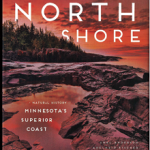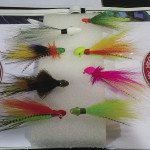Enroute to Thunder Bay, Ontario last week, I stopped at Ryden’s Border Store to exchange U.S. funds for Canadian money. For $200 U.S., I received $282 Canadian in exchange. The extra money bought lunch for three of us at a nice restaurant.
During the past year, the Canadian dollar has taken a tumble. Currently the Loonie is worth about 70 cents in U.S. funds. This has slowed Canadian shoppers from heading south of the border, but it’s a good deal for Americans, especially those of us who like to hunt and fish. This is a great year to head to Canada. Another plus is that gas prices have dropped significantly, although they remain higher than in the U.S. Still they’ve dropped enough to make a difference on an extended road trip. Banff, anyone?
When there was a favorable exchange in the past, I travelled from coast to coast across Canada. One memorable trip was a winter steelhead fishing adventure to Vancouver Island. Three of us flew WestJet, a Canadian airline, from Thunder Bay to Victoria, where we rented an SUV for seven days of exploring some of the finest, accessible steelhead and salmon rivers. Since it was off-season, the accommodations were cheap. The entire trip cost each of us well under $1,000 U.S.
If you head north, expect to find Canadians to be very welcoming. Their U.S. tourism has taken a hit during the 15 years since 9/11. New border restrictions, such as Americans being required to show a passport to enter their own country (you don’t need a passport to enter Canada) and Canada barring Americans who had a DUI conviction, prompted many Americans to stay home. In Ontario, the ban of the spring bear hunt (which soon may be reinstated) was a blow to hunting and fishing tourism. So, too, were changing demographics. While previous generations enjoyed Canadian fishing vacations, today’s crowd—not so much.
The fishing remains. By Minnesota standards, Canadian fishing is darned good. Generally, fish of all species are bigger and more numerous up there. The waters are uncrowded, too. Canada offers interesting hunting opportunities, too. In fact, an Ontario moose hunt may be one of the best bargains in nonresident big game hunting.
As a frequent visitor to Canada, I can offer a few suggestions about how to make the most of your north-of-the-border experience. For starters, realize you are in a foreign country. It’s not the same as going to, say, Wisconsin. Respect the fact that Canadians do things a little differently. The easiest way to do that is by not making comparisons to “the way we do it in the States” when talking with them.
On the same thread, follow their rules. Spend some time reading the fishing or hunting regulations booklets or ask questions of your outfitter. Even if you are in the middle of nowhere, expect to encounter a conservation officer. I’ve been checked as many or more times in Ontario as I have been in Minnesota. If you choose to drink, don’t do so in your vehicle or on the water. DUI rules are stricter in Ontario than in Minnesota. DUI is a felony offense in Canada, which is why they don’t allow Americans with recent DUIs into the country.
Before you go to Canada, change your Yankee dollars for Canadian currency. Canadian businesses accept American cash, but don’t expect a convenience store, restaurant or other business to give you the going rate of exchange. If you don’t want to carry cash, use a credit card for transactions, because the card will give you the current exchange rate. Some businesses, such as camps and outfitters, may show their prices in U.S. dollars. If the price in U.S. funds is clearly stated on their marketing brochures or on their website, that is their way of doing business with Americans. However, always make sure if a price stated is in Canadian or U.S. funds before you lay your money down.
While Canadians are notoriously wild and crazy drivers, obey the speed limits and traffic laws. You don’t need to understand the metric system to follow the speed limit, because nearly all American vehicles show kilometers as well as miles on the speedometer. The only time I’ve received a speeding ticket was in Ontario. As I recall, I paid the fine on the spot with a credit card.
When crossing the border, be polite and answer the questions. If you have a DUI or another previous conviction, do some homework to find out if that may prevent you from entering the country. It is my understanding that a DUI conviction more than five years old won’t be an issue. You can also file some paperwork (for a price) that will allow you to cross the border. Also, pay attention to the restrictions on live bait, the amount of alcohol or tobacco you may have, and various foodstuffs, such as potatoes. Again, you are entering a foreign country, not Wisconsin.
Be sure you have proper identification for everyone, including children, for whom you should have birth certificates. I generally use a passport card, a wallet-sized version of a passport that is good for entry by land or sea. You can also carry a passport or an enhanced driver’s license, which is now available in Minnesota. While one of these documents is required to return to the U.S., it is very unlikely an American citizen would be denied entry if all they had was a driver’s license or a similar form of identification.
If you don’t have a passport and you’d like to go fishing in Canada this summer, apply now to get one. It generally takes about six weeks for your passport application to be processed. While some folks make a big deal about doing so, once you do, it’s good for 10 years. Or, to put it another way, it’s your passport to a decade of Canadian fishing.




